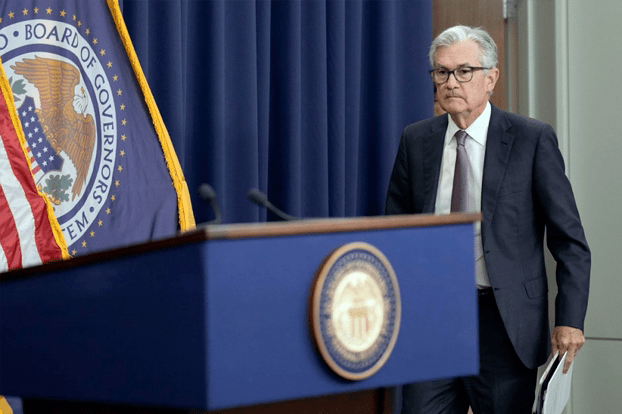
In the face of increasing pressure from President Donald Trump to resign, Federal Reserve Chairman Jerome Powell has informed a number of his allies that he does not intend to step down, affirming his determination to withstand the unprecedented presidential campaign aimed at forcing him to cut interest rates.
Powell believes that his continuation in office is not only about personal considerations but is a defense of the independence of the country's most important monetary institution, according to sources familiar with his private conversations, seeing any move to resign now as an indication of yielding to political pressure that threatens the independence of the 'Federal Reserve'.
Republican Senator Mike Rounds from South Dakota, one of those who spoke directly with Powell about the possibility of his resignation, said: "He feels a great responsibility to protect the independence of the institution. I personally asked him, and he assured me that he would not resign, as that would undermine the independence of the Federal Reserve."
Powell, whose term ends in May 2026, has become the target of repeated attacks from the White House due to his refusal to cut interest rates despite increasing pressures, and this escalation has placed the Federal Reserve's usual decisions under an unprecedented microscope, raising concerns about political interference in monetary policy and its impact on the economy.
In recent weeks, Trump has intensified his attacks, calling Powell 'stupid', 'hard-headed', and 'one of the worst appointments I've made', also implying that Powell is seeking to undermine his presidency, publicly expressing his desire for Powell to resign.
Despite all that, Trump's advisors warned that firing Powell could spook the markets and push the economy into a crisis, which is why the president chose to publicly pressure and smear Powell instead of directly firing him.
A tour at the 'Federal Reserve' headquarters
In a new attempt to increase pressure, Trump visited the Federal Reserve headquarters on Thursday, where he was personally accompanied by Powell on a tour inside the $2.5 billion headquarters renovation project, and the president raised questions about the project's cost, considering that 'excessive spending' could justify a firing.
During the tour, Trump joked with Powell saying: 'I will love you if you lower interest rates,' while Powell simply smiled awkwardly.
Trump's allies see the renovation project as an effective way to pressure Powell, promoting the idea that the massive spending on the federal building contrasts with Americans' struggles to buy homes due to high interest rates.
One of Trump's advisors likened the pressure strategy to the 'boiling frog' trick: 'Either Powell jumps or he gets boiled', referring to the continued pressure until resignation or submission. Despite all this, Powell, according to those close to him, ignores the political pressures and continues to focus on his mission: to shape monetary policy based solely on economic data.
After their recent meeting at the 'Fed' headquarters, Trump said his conversation with Powell was 'very productive', adding: 'I don’t want to be a critic; on Monday morning... things got out of hand, and that happens.'
But this temporary easing is expected to fade, as the 'Fed' is anticipated to decide next week to maintain interest rates, delaying any changes until the fall, which may anger the president again.
Democratic support and Republican warnings
In contrast, Powell has found support from Democratic officials, despite their previous criticisms of him when he raised interest rates during the Biden administration, who see Powell's decisions as aimed at protecting the credibility of the 'Fed', even at the cost of his personal comfort.
Jared Bernstein, former chair of the Council of Economic Advisers under Biden, said: 'If I were him, 72 years old, and being insulted daily, I would consider retirement, but he puts the institution's interest above his own.'
Moderate Republicans fear that public political pressures could undermine the credibility of the 'Fed's' decisions, urging the White House to cease its attacks, especially if Trump wishes to gain politically when the 'Fed' actually begins to lower rates.
Senator Rounds concluded by saying: 'The majority of senators are well aware of the impact of any signals of political interference in the Fed's decisions. Powell is in a very difficult position, but he is doing what he should, and I appreciate him for his stance.'
Powell and his colleagues step into the Federal Reserve Board room tomorrow, Tuesday, to consider interest rates amid immense political pressure, developments in trade policy, and conflicting economic trends.
In a rare event, policymakers will meet in the same week that the government releases GDP reports, employment, and the preferred price metrics of the 'Federal Reserve'.
Federal Reserve officials will meet on Tuesday and Wednesday, and it is widely expected that they will keep interest rates unchanged. Forecasting entities estimate that the intensive data package will show a rebound in economic activity in the second quarter, largely due to a sharp decline in the trade deficit, while job growth slowed in July.
While the government's preliminary estimate of quarterly GDP is expected to show a 2.4% annual increase - after the economy contracted by 0.5% from January to March - the report on Wednesday is likely to reveal only modest demand from households and business investment.
